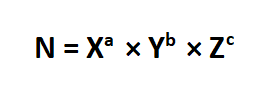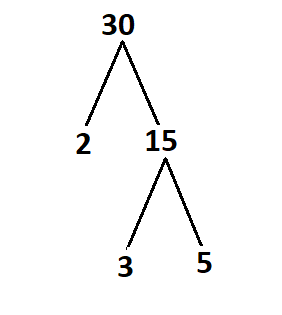Prime numbers are numbers that have only 2 factors 1 and themselves.
Prime factorization, integer factorization and factor decomposition of a number is breaking a number down into the set of prime numbers which multiply together to result in the original number.
Formula to calculate prime factorization.

Where;
- N is any number
- X, Y, and Z are prime factors of number N.
- a, b, and c are the exponents of prime factors X, Y, and Z respectively.
Example:
Find the prime factors of 30 using the prime factorization tree.

Therefore, the prime factors of 30 are 2, 3 and 5. Since the factors have no exponents, it means that there is one 2, one 3 and one 5.

